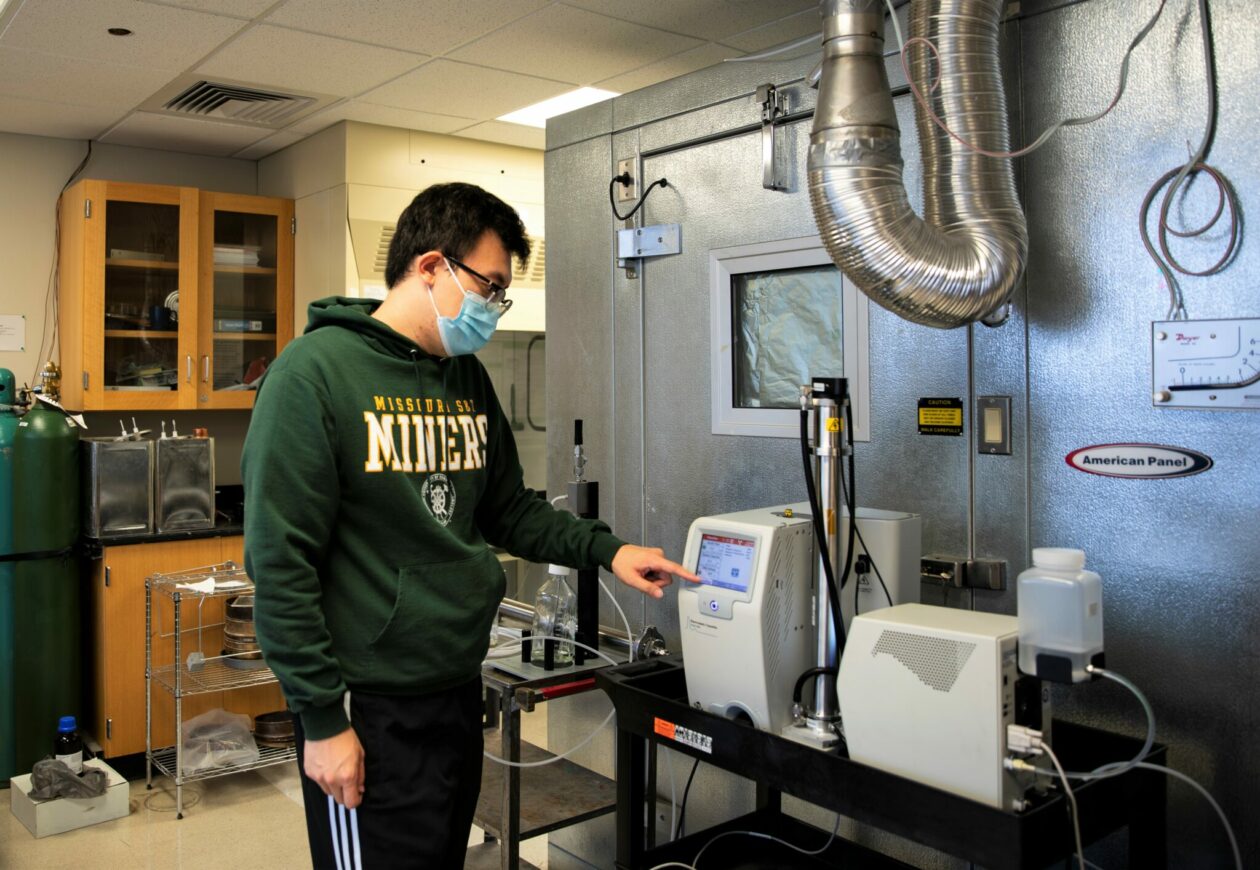Over the holidays, replacing the furnace filter could help protect people from COVID-19 indoors
Posted by Nancy Bowles

Ph.D. student Weixing Hao works in Dr. Yang Wang’s lab with an environmental chamber used to analyze bioaerosols.
Amid the food, gifts and well wishes, the holidays could have a new star – a furnace filter. Until a vaccine is ready, a high-efficiency furnace filter used along with other precautions could help protect people from COVID-19 as they spend more time together indoors.
Dr. Yang Wang, assistant professor of civil, architectural and environmental engineering at Missouri S&T, is leading a team of researchers to study the particles – called bioaerosols – released by people when they speak, sing or cough. They are observing how viruses travel through the air, how time and environmental conditions affect the viability of viruses, and how proper ventilation can help control viral spread.
“What we’re seeing is that particles as large as 10 microns can remain airborne for several minutes after being generated by coughing or speaking,” Wang says. “If someone has a high virus load and speaks or coughs, that’s going to generate more airborne viruses.”
Dr. Guang Xu, associate professor of mining engineering at Missouri S&T and co-investigator on the project, is an expert in ventilation. He is running simulations in the laboratory’s environmental chamber using bioaerosols that contain pathogens similar to SARS-CoV-2, the virus that causes COVID-19. Another co-investigator, S&T biological sciences professor Dr. Yue Wern Huang, is providing biological analysis of the bioaerosols. The project is funded by a $330,000 grant from the National Science Foundation.
Wang points out that the Environmental Protection Agency recommends air filters with a rating of at least MERV 13 for homeowners who want to improve general indoor air quality. A higher MERV (Minimum Efficiency Reporting Values) rating means the filter can trap smaller particles, including viruses. Wang says that as people gather over the holidays, a portable air filter could provide additional protection, and it can be a simple do-it-yourself device. Wang says a box fan with air filters taped to the front and back can provide additional air filtration.
“In businesses, homes and schools, ventilation systems need to work well and have high-efficiency filters to help slow the spread of COVID-19,” says Wang. “But filters alone are not enough. People also need to follow the simple guidelines of wearing a mask, maintaining physical distancing and washing their hands thoroughly and often.”
About Missouri University of Science and Technology
Founded in 1870 as the University of Missouri School of Mines and Metallurgy, Missouri University of Science and Technology (Missouri S&T) is a STEM-focused research university of over 7,600 students and part of the four-campus University of Missouri System. Located in Rolla, Missouri S&T offers 99 different degree programs in 40 areas of study, including engineering, education, the sciences, business and information technology, the humanities, and the liberal arts. Missouri S&T is known globally and is highly ranked for providing a high return on tuition investment, exceptional career opportunities for graduates, and an emphasis on applied, hands-on learning through student design teams and cooperative education and internship opportunities. For more information about Missouri S&T, visit mst.edu.
Excellent work that can make us safer. MO S&T continues to lead- congratulations to our student expert!
I also recommend getting the ASRAE standards which were updated and available on the web
detailing this issue that match well with this study!
Have a safe Thanksgiving- things will be better in 2021/